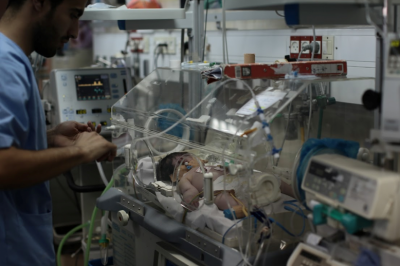UN Warns “Collapse of Critical Life-saving Services” in Gaza as Emergency Fuel Runs Out
This week, the UN Humanitarian Coordinator for the occupied Palestinian territory, Mr. Jamie McGoldrick, warned of the “collapse of critical life-saving services” in Gaza as UN emergency fuel runs out.

Note to readers: please click the share buttons above
With no main electricity for 16-20 hours per day, hospitals in Gaza are reliant on backup generators to keep essential services running. UN-donated fuel to keep these life-saving services running is expected to be used up in the next few days unless emergency funding is secured.
On Monday, Mr McGoldrick called on the international community to urgently prevent essential services from shutting down:
“Life-saving services in the Gaza Strip rely heavily on donor-funded emergency fuel. We have now run out of funds and are delivering the final supplies in the next few days. Without funds to enable ongoing deliveries, service providers will be forced to suspend, or heavily reduce, operations from early September, with potentially grave consequences.”
The severe shortage of emergency fuel endangers patients’ lives, including new born babies in intensive care – a service supported by Medical Aid for Palestinians (MAP) in Gaza. This was emphasised by the UN this week:
“Among the most vulnerable to shortages are 4,800 patients in Gaza’s hospitals, who rely each day on electrical devices in intensive care units, including newborns, and those on dialysis or in trauma departments. Medical services for over 1.6 million other Palestinians will suffer from reduction or cessation of services, due to lack of emergency fuel at the main health facilities, and over half the population face the risk of possible sewage overflow, if fuel runs out for the 41 main sewage pumping stations in the Gaza Strip. Overall, the reduced functioning of water and sanitation facilities risks an increase of waterborne disease and outbreaks in a densely-populated, urban area.”
It is vital that international donors, including the UK, step in immediately to keep Gaza’s health system running. In the long-term, they must also work towards sustainable solutions to the electricity crisis, including through a lifting of Israel’s 11-year illegal closure. The UN estimates that US$4.5 million is required to cover humanitarian fuel costs until the end of 2018.
The crisis affecting the provision of health services in Gaza is further compounded by the mass trauma casualties which have entered hospitals in the context of Israel’s use of force against protesters taking part in the “Great March of Return” since 30 March.
On Friday 17 August, the twenty-first Friday of the “Great March of Return” demonstrations, a high number of casualties were again reported. According to the Ministry of Health, two Palestinians were killed and 270 injured by Israeli forces. Karim Abu Fatair, 30, was fatally shot in the head by an Israeli sniper near to the perimeter fence in central Gaza. Saadi Akram Ahmad Abu Maamar, 27, also succumbed to his wounds at demonstrations in central Gaza.
Since 30 March, 160 Palestinians have been killed and 18,000 people injured. According to the World Health Organization, 9,447 people have been hospitalised, of whom 48% (4,508) were shot. Of those hospitalised 5,924 received limb injuries.
Outside of hospitals, frontline health workers have come under attack by Israeli forces using live ammunition, tear gas and rubber bullets. From 30 March to 13 August, three paramedics have been killed and 379 injured. Two health facilities – a health centre for people with disability and a Ministry of Health ambulance station – were also reportedly damaged in and Israeli air strike on 14 July.
*
Featured image is from MAP.

